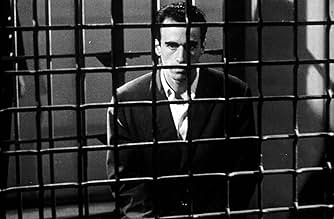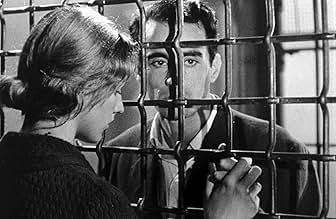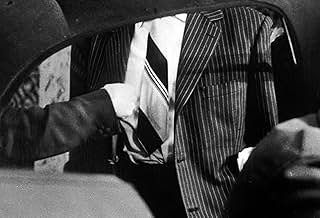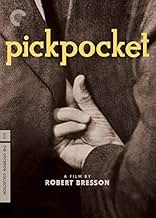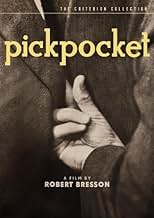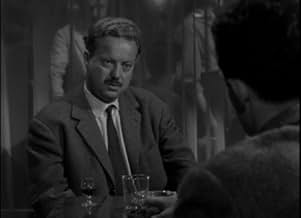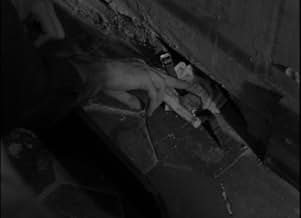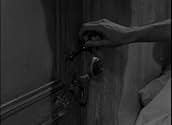Pickpocket
- 1959
- Tous publics
- 1h 16min
NOTE IMDb
7,5/10
27 k
MA NOTE
Michel est libéré de prison après avoir purgé une peine pour vol. Sa mère meurt et il a recours au vol à la tire pour survivre.Michel est libéré de prison après avoir purgé une peine pour vol. Sa mère meurt et il a recours au vol à la tire pour survivre.Michel est libéré de prison après avoir purgé une peine pour vol. Sa mère meurt et il a recours au vol à la tire pour survivre.
- Réalisation
- Scénario
- Casting principal
- Récompenses
- 3 nominations au total
Avis à la une
Pickpocket is a film that apparently has serious flaws- from the very beginning it displays little to no emotion as the actors on screen just say their lines and the camera just follows them from a distance, with no close-ups or any other tricks.
But what is unique about this film is that this very criticism is actually a deliberate attempt to cause uneasiness in the viewer. And it succeeds- the anxiety, as felt by the pickpocket in his everyday living, is also transmitted to us. So, to correct my previous statement: this movie does not lack emotions- it has emotions: anxiety, uncertainty, but these are delivered in an unconventional manner.
From a personal standpoint, I wasn't sure if I liked it or not. It is hard to appreciate this dimension of the film at first. But after seeing some extras from the excellent Criterion package, I was able to understand better. How Bresson actually committed to cause these emotions in the viewer, how he re-shot several times various scenes until the actors just repeated their lines, until no trait of emotions were left. Michel's narration voice-over is flat, plain. These were non-professional actors set to work in a non-standard way, Bresson's way. And the result is this: a film somewhat off-putting, but still a great work of art.
But what is unique about this film is that this very criticism is actually a deliberate attempt to cause uneasiness in the viewer. And it succeeds- the anxiety, as felt by the pickpocket in his everyday living, is also transmitted to us. So, to correct my previous statement: this movie does not lack emotions- it has emotions: anxiety, uncertainty, but these are delivered in an unconventional manner.
From a personal standpoint, I wasn't sure if I liked it or not. It is hard to appreciate this dimension of the film at first. But after seeing some extras from the excellent Criterion package, I was able to understand better. How Bresson actually committed to cause these emotions in the viewer, how he re-shot several times various scenes until the actors just repeated their lines, until no trait of emotions were left. Michel's narration voice-over is flat, plain. These were non-professional actors set to work in a non-standard way, Bresson's way. And the result is this: a film somewhat off-putting, but still a great work of art.
In his dismissal determination to keep out elements often thought fundamental to the mediumspectacle, drama, performance Bresson has followed an incomparable personal vision of the world that stays consistent whatever the nature of his subject matter...
In "Pickpocket," a petty thief understands life's mystery only when his conventional wisdom is violently shaken and embraces humanity through his newfound love Most notable, however, is not the emphasis upon redemption attained through communication and self-sacrifice, but the high-purity of Bresson's style...
The camera keeps out pictorial beauty to create an abstract timeless world through the detached, detailed observation of hands, faces, and objects; natural sounds rather than music to satisfy the need In thus rejecting conventional realism and characterization, Bresson manifested a fascination not with human psychology but with the capacity of the soul to survive in a world of pain, disbelieve, and restriction...
In "Pickpocket," a petty thief understands life's mystery only when his conventional wisdom is violently shaken and embraces humanity through his newfound love Most notable, however, is not the emphasis upon redemption attained through communication and self-sacrifice, but the high-purity of Bresson's style...
The camera keeps out pictorial beauty to create an abstract timeless world through the detached, detailed observation of hands, faces, and objects; natural sounds rather than music to satisfy the need In thus rejecting conventional realism and characterization, Bresson manifested a fascination not with human psychology but with the capacity of the soul to survive in a world of pain, disbelieve, and restriction...
Robert Bresson's Pickpocket has many great moments, even as it didn't quite do it for me on a first viewing as a 'masterpiece'(some have said to see it twice, perhaps I will). Bresson's use of the camera is often intoxicating in the most subdued, subtle, in-direct distinctions; at times it does take on the prowess of literature. But my only minor nitpick with the film is that it leaves a sort of cold viewing on a viewer, with such simplicity and emotions stripped from the character(s) that it's hard to connect. And yet, this is really made up tenfold with the sort of style that can be likely called Bressonian; straightforward angles, tense medium close-ups, serene editing, and little to no music.
Whatever it sets up for this actor to do, it sets up well. Indeed, the actor who plays the protagonist here is actually very good, aside from the disconnection, and provides an excellent way for us to get along his side. He is a decent person, but there are certain things that get to him, which is why he feels he must steal. At times I almost had a grin as he made some successful grabs, by himself or his cohorts. Was I rooting for him, or just pleased by the pay-off of Bresson's suspense? Maybe both; there is definitely one truly virtuoso sequence in the film, when the pickpockets go on the train.
Like A Man Escaped, there is that sort of dissection, quietly and without really digging too deep, into what a man wants with his life, or doesn't want. While the hero has only one determination in Man Escaped, to get out, Pickpocket has a man who doesn't know what to do with himself, only coming to a genuine catharsis behind bars. I think I like Pickpocket a little more, but I may like it even more on another viewing.
Whatever it sets up for this actor to do, it sets up well. Indeed, the actor who plays the protagonist here is actually very good, aside from the disconnection, and provides an excellent way for us to get along his side. He is a decent person, but there are certain things that get to him, which is why he feels he must steal. At times I almost had a grin as he made some successful grabs, by himself or his cohorts. Was I rooting for him, or just pleased by the pay-off of Bresson's suspense? Maybe both; there is definitely one truly virtuoso sequence in the film, when the pickpockets go on the train.
Like A Man Escaped, there is that sort of dissection, quietly and without really digging too deep, into what a man wants with his life, or doesn't want. While the hero has only one determination in Man Escaped, to get out, Pickpocket has a man who doesn't know what to do with himself, only coming to a genuine catharsis behind bars. I think I like Pickpocket a little more, but I may like it even more on another viewing.
- Do you feel lonely ? -Bresson : very lonely . Very but I don't like it to be lone !!
It would be hard for a regular movie-watcher , some one who just watches for fun , to like the movies made by formalist , strictly stylist director , Robert Bresson . But when we are aware of his elaborate work and subtlety , we admire his skill , undoubtedly .
Pickpocket ( 1959 ) , is one his best and most thoughtful films and has a key role in recognizing both Bresson and his works .
Pickpocket is about an alone and desperate writer who think of himself as a superior to the society ; He thinks he is better than others and believes to be in the right of breaking the rules and neglecting the social Contract .
He defines justice for himself as " some people have the privilege to break the laws , willingly " . He feels humiliated to do regular jobs and thus , begins pocket picking .
And from one of the most basic elements of the story , i.e. main character , there is a gap , a distance , between us ( audience ) and the film . In fact , because of non-naturalistic quality of the plot , we can't sympathize with him ; and what makes him even more distant , is the Bresson's personal touch and fond of "deadpan acting and not showing emotions " . Bresson says himself that " if possible , he prefers to utilize an image , a sound , and any other elements ( and metaphors ) instead of actors " . He wants the actors ( as a matter of fact he uses non-professional actors after his second movie ) to act deliberately and be aware of a witness called camera . In other words he wants them " not to act " .
In this movie , the cast and specially the hero are totally flat and expressionless ; even his walking style is sort of flat . But we can't reject his way of acting ( in fact , not acting ) . There is a deep coldness in this style of performance which makes it surprisingly and paradoxically acceptable and fits well in the world of the movie ; particularly , sympathetic face of the main character which increases contributes in this plausibility .
The cinematography , lighting and playing with shadows and lights in this movie is truly delicate and these factors in addition to a cold open and sort of suspension , forms the idea of a thriller movie . Yes ! Suspension is a key factor here ; and not a regular kind of suspension ; but a Bresson type .
Even , some think that sound editing in this movie , decrease the suspension in some scenes and increase it in some other scenes . For example , in some occasions , a sound or noise , inform us of the occurrence of an incident ; or repeating a sound in another scene can mitigate the effect of suspension . Also there is a scene in which the main character is walking anxiously in a crowded sidewalk ; we can not hear the sounds , the street noise and even the cars ; the only sound is his footsteps , which makes suspension .
It is true that use of music is not considerable in this film , but we can't renounce the sound effects here .
Another point is that Bresson never lets the main character to show fear and anxiety ( unlike Hitchcock who loves to do so ) ; instead he depends on images and sounds to supply the fear : sound of footsteps , images of shaking hands and cold faces ( the opening scene ) , door handle turned quietly and actually anything .
There are some references to" Dostoyevsky's Crime and Punishment" ; like the basic similarities between the heroes : Michel and Raskolnikov who both tend to commit crimes ; both being lonely and isolated and even the hole behind Michel's bed he use to hide the stolen valuable goods ( like Dostoyevsky's hero ) . Knowing these references , is a suspension itself ; some kind of fear .
Yes ! most of the times , we don't have music ; the music remains silent , and waits ; ( something unusual in those days of film-making ) ; yet , this small appearance of music , is fitting and timely . There is no such a thing as spare scenes or excess dialog in this movie ; everything is in its right place and for those who can't comprehend the non- naturalistic structure of the film , and can not accept fears , anxiety , and emotional disturbances of this cold hero , Bresson arranges the famous final scene in which the main character redeems through love ; with music !! Now , let us come back to the QA we had at the beginning of this article ; we see Bresson , lonely like the hero of his film ; self-consciously tries to break the rules ( another kind of rules ) ; and has a style of his own ! And make us to admire his mastership and loneliness !
More interesting than any individual film, it's Bresson's philosophy that I feel is worth examining. He's all about striving, the question is what for? If it's purity, as most would agree, and purity always seems like something to aspire to, is it a purity that we can take as a base for living?
I don't think I will have conclusions before Balthazar, perhaps his most famous. Already, since Diary of a Priest, I can see him moving in a direction, growing that philosophy. Even more sparse, even more laconic, removes flourish and leaves bare floors so that we endure something being revealed in the pacing. That's fine. More revealing is another trajectory being delineated, human- based.
It's once more about a lone youth who struggles with a life that suffocates. In Diary he was a pious young priest who wanted absolute sincerity in the face of life; but people were complicated beings, the journey caused spiritual torment, questions of angst abounded. In Man Escaped the same youth becomes a prisoner, also endures a life of anguish, but now endures quietly, without torment and piety. It was Bresson peeling away the romanticizing of suffering of Diary, what was left was simply the work of breaking free from that prison- world, stoicism in place of romanticism.
So what does he do in this next one? The same youth once more, but now he's not bound by duty to truth or has any work set out before him. Now he's free to wander the world which the man in Escaped had struggled to break free to. Without an intellectual or other struggle before him, he's simply awash with time. He's stifled by the freedom, he has no place. He perceives himself as a man of lofty talents, possibly a genius, but wastes these talents in being a pickpocket around town who won't even go see his dying mother. He always comes and goes from his tiny apartment to no real purpose.
Observant viewers will note the equation of pickpocketing as presented in the film, an elaborately precise choreography of hands and motions, with Bresson's own filmmaking. Film lore touts him as pure and simple as if that simplicity is conquered without effort, in truth he's all about the meticulous timing and moving of exact pieces. His favorite tool is exactly this game of hide and show that controls what we see; for example a scene like in Man Escaped where the new cellmate is introduced off-camera, we don't know who our man is talking to until we turn to see. He does it here too, often by having characters turn and leave, questions hanging, creating gap and resonance. He's the opposite of natural.
Back to the conundrum expressed at the beginning however; if this is pure, what does it strive purely for?
The only answer I get here is that we no longer have a man who is trying to understand life, or someone who works towards an end, these selves have been shed. Now we have someone who endures, but has no idea exactly what or what for. It's Bresson inching towards the same cessation that he strives for visually. What stands before him now is what he sketches in the opening intertitle; something pushes the man from the inside.
He bangles this all up at the end, and I believe that looking back he would probably have been unsatisfied himself. He reverts back to his romanticism where the tormented young man has love reserved for him, but a wistful love that doesn't feel earned, there's simply nothing that rings true about her infatuation with him. This is Eva Green's aunt by the by.
So this has done its job, shed one self and one set of conundrums and replaced them with another. Onwards to his next, which looks like another draft of the same philosophy, and then Balthazar is around the corner. I already believe I disagree with Schrader.
I don't think I will have conclusions before Balthazar, perhaps his most famous. Already, since Diary of a Priest, I can see him moving in a direction, growing that philosophy. Even more sparse, even more laconic, removes flourish and leaves bare floors so that we endure something being revealed in the pacing. That's fine. More revealing is another trajectory being delineated, human- based.
It's once more about a lone youth who struggles with a life that suffocates. In Diary he was a pious young priest who wanted absolute sincerity in the face of life; but people were complicated beings, the journey caused spiritual torment, questions of angst abounded. In Man Escaped the same youth becomes a prisoner, also endures a life of anguish, but now endures quietly, without torment and piety. It was Bresson peeling away the romanticizing of suffering of Diary, what was left was simply the work of breaking free from that prison- world, stoicism in place of romanticism.
So what does he do in this next one? The same youth once more, but now he's not bound by duty to truth or has any work set out before him. Now he's free to wander the world which the man in Escaped had struggled to break free to. Without an intellectual or other struggle before him, he's simply awash with time. He's stifled by the freedom, he has no place. He perceives himself as a man of lofty talents, possibly a genius, but wastes these talents in being a pickpocket around town who won't even go see his dying mother. He always comes and goes from his tiny apartment to no real purpose.
Observant viewers will note the equation of pickpocketing as presented in the film, an elaborately precise choreography of hands and motions, with Bresson's own filmmaking. Film lore touts him as pure and simple as if that simplicity is conquered without effort, in truth he's all about the meticulous timing and moving of exact pieces. His favorite tool is exactly this game of hide and show that controls what we see; for example a scene like in Man Escaped where the new cellmate is introduced off-camera, we don't know who our man is talking to until we turn to see. He does it here too, often by having characters turn and leave, questions hanging, creating gap and resonance. He's the opposite of natural.
Back to the conundrum expressed at the beginning however; if this is pure, what does it strive purely for?
The only answer I get here is that we no longer have a man who is trying to understand life, or someone who works towards an end, these selves have been shed. Now we have someone who endures, but has no idea exactly what or what for. It's Bresson inching towards the same cessation that he strives for visually. What stands before him now is what he sketches in the opening intertitle; something pushes the man from the inside.
He bangles this all up at the end, and I believe that looking back he would probably have been unsatisfied himself. He reverts back to his romanticism where the tormented young man has love reserved for him, but a wistful love that doesn't feel earned, there's simply nothing that rings true about her infatuation with him. This is Eva Green's aunt by the by.
So this has done its job, shed one self and one set of conundrums and replaced them with another. Onwards to his next, which looks like another draft of the same philosophy, and then Balthazar is around the corner. I already believe I disagree with Schrader.
Le saviez-vous
- AnecdotesBanned in Finland until 1965 because of its depiction of authentic pickpocketing techniques.
- ConnexionsEdited into Histoire(s) du cinéma: Une histoire seule (1989)
- Bandes originalesSuite de symphonies d'Amadis (selection)
(uncredited)
Music by Jean-Baptiste Lully (as J.B. Lulli)
Éditions Transatlantiques
Meilleurs choix
Connectez-vous pour évaluer et suivre la liste de favoris afin de recevoir des recommandations personnalisées
- How long is Pickpocket?Alimenté par Alexa
Détails
Box-office
- Montant brut mondial
- 7 541 $US
- Durée1 heure 16 minutes
- Couleur
- Rapport de forme
- 1.37 : 1
Contribuer à cette page
Suggérer une modification ou ajouter du contenu manquant


